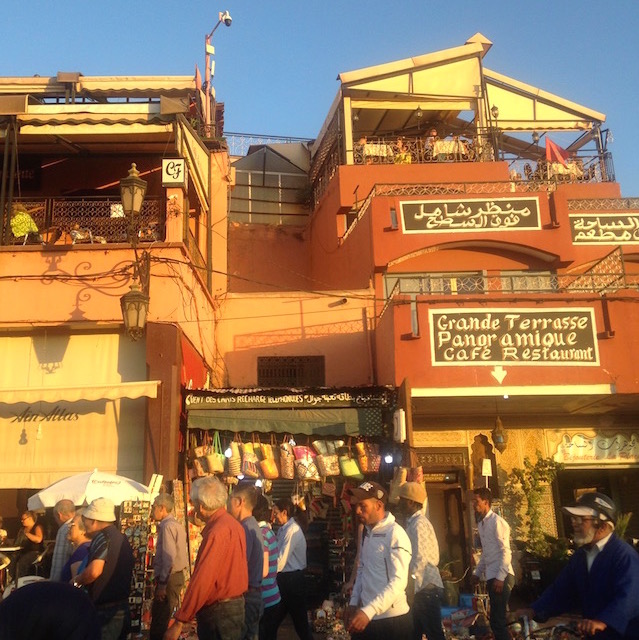
I had been warned about Marrakesh: pay attention to your purse, always watch where you are going, everyone is going to want to cheat you—and whatever you do, never ever appear to be lost or ask anyone for directions.
When we first arrived, our friend took us the main square, Djemaa El Fna, and slowly explained to us how to find our way back home.
Very soon, I actually felt quite comfortable and not the least bit in danger.
Exploring the old citadel was enchanting, pleasurably disorienting, and hypnotizing. The cocktail of exotic sounds (including the call to prayer), spicy smells, and eye-popping sights had me at the edge of overwhelm within an hour, and on this one particular day, I decided to find my way back home before dark.
Just before making that left turn onto the tiny street, I spotted a makeshift stall, nested inside a wall. Looking at it more closely, I saw an older gentleman perched on a stool inside the dusty recess, dunking a chunk of dough into a homemade vat of hot oil.
Shoot. Donuts.
The part of my brain which is reserved for all things donut instantly lit up like a Christmas tree. Donuts. In Marrakesh. Gratitude.
The notion of gluten did not dare make a peep, nor did anything potentially related to food safety. There was a man making donuts dressed in a burgundy djellaba. This was all I needed to know.
Showing a couple of fingers to indicate that I would “please like two of these babies,” I placed my order. My salivary glands were clapping their little hands in glee.
Once out of the hot oil, two glorious donuts were artfully tied together with a little reed and—almost—handed out to me, along with a request for two dirhams. I handed the man a one hundred dirham bill, which earned me a puzzled look, a retraction of the donuts, and a shake of the head. No change.
One hundred dirhams was all I had on me. What were we going to do?
It’s funny how even when we think that all is fine and we are handling what us French call dépaysement* so very well, it actually does not take all that much to get us off kilter pretty quickly. In this case, I was both concerned about keeping my fresh donuts and manoeuvering a smooth-ish transaction, one that would not make the older man angry nor get me into a Moroccan jail.
My one hundred dirham bill (about ten dollars) was suddenly swept away and delivered to another booth, either to never return, or as an attempt for change. It did return. And we still had a change issue.
That’s about the time when a young man appeared by my right shoulder, and in a strongly accented French offered to pay for my donuts.
Something about the midday heat, the financial negotiation in fast-paced Arabic, and the small crowd that was gathering around the donut stall had me feeling on my guard. Mostly, I was hearing voices in my head, voices that weren’t mine: I had been warned about being careful. I had been warned about being robbed. I had been warned about being cheated. What did this young guy want?
I declined with a smile and a universal shake of the head.
The one hundred dirham bill went for another round around the neighborhood, in the other direction this time. My donuts were getting cold. The kid to my right was insisting. The voices in my head were snickering.
The bill came back. No change.
At that point, I was ready to leave with no change. One hundred dirhams for two Moroccan donuts? So be it. God knows I had made worse transactions before.
But there was that kid, again. He wasn’t letting go.
“Ma’am, please let me pay for your donuts? Please?”
Okay, fine. Whatever trickery it was to be, I was ready to see it. I was hot. I wanted my fried dough. How bad could it be?
I thanked him and said that that would be really nice of him. Then I waited.
This is the part where things got really weird:
The young man handed the old man his two dirhams.
The old man nodded, took the young man’s two dirhams, and handed me my donuts.
Then the young man turned to me and with a hand over his heart, said, “Thank you, Ma’am. Thank you for letting me buy these for you. I hope you enjoy them very much.”
End of story.
No trickery, no running through hot labyrinth streets chasing anyone, no terrible prison.
Just…donuts and kindness.
I nodded and I thanked him again.
My eyes stung. My throat was tight. My cheeks were flushed with shame. So much shame.
For a moment there, I had lost myself and my belief in people’s goodness. Why? Because I did not have the right amount of change, because it was hotter than hell, because I did not speak Arabic, and because I had bought into stories.
How strong is my conviction then, really?
Thinking about this day months ago, I can still feel the shame. I think I always will. I hope I do.
Today, I want to invite you to stay strong—stronger than I was that day—in your convictions.
I want to invite you:
1) to listen to your own voice, in the midst of everyone else’s.
2) to be nice to yourself whenever you sway a little bit off track.
3) to try Moroccan donuts whenever you get a chance.
P.S. *Dépaysement is a very specific French word which is sometimes ill translated as homesickness. It’s not homesickness at all. It is more a feeling of disorientation that specifically arises when you are not in your home country.
Author: Laura Lavigne
Image: Author’s Own
Editor: Sara Kärpänen
Copy editor: Nicole Cameron










Read 1 comment and reply